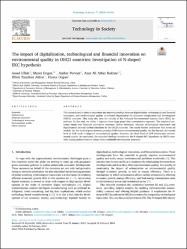| dc.contributor.author | Ullah, Assad | |
| dc.contributor.author | Doğan, Mesut | |
| dc.contributor.author | Pervaiz, Amber | |
| dc.contributor.author | Ather Bukhari, Azaz Ali | |
| dc.contributor.author | Akkuş, Hilmi Tunahan | |
| dc.contributor.author | Doğan, Hüsna | |
| dc.date.accessioned | 2025-01-02T08:04:03Z | |
| dc.date.available | 2025-01-02T08:04:03Z | |
| dc.date.issued | 2024 | en_US |
| dc.identifier.issn | 0160-791X / 1879-3274 | |
| dc.identifier.uri | https://doi.org/10.1016/j.techsoc.2024.102484 | |
| dc.identifier.uri | https://hdl.handle.net/20.500.12462/15635 | |
| dc.description | Akkuş, Hilmi Tunahan (Balikesir Author) | en_US |
| dc.description.abstract | his research article aims to determine the interrelationships between digitalization, technological and financial innovation, and environmental quality in selected Organization for Economic Cooperation and Development (OECD) countries. This study also tests the validity of the N-shaped Environmental Kuznets Curve (EKC) hypothesis. To this end, we utilize a rigorous three-stage panel data econometrics approach. The empirical outcomes entail that financial innovation decreases carbon emissions, whereas technological innovation and digitalization increase carbon emissions in the OECD countries. The results further underscore that across all models, the first level of gross domestic product (GDP) harms environmental quality. On the flip side, the second level of GDP tends to improve environmental quality. However, the third level of GDP deteriorates environmental quality. In conclusion, the empirical findings corroborate the N-shaped EKC hypothesis in OECD countries, urging policymakers to adopt more sustainable development practices. | en_US |
| dc.language.iso | eng | en_US |
| dc.publisher | Elsevier | en_US |
| dc.relation.isversionof | 10.1016/j.techsoc.2024.102484 | en_US |
| dc.rights | info:eu-repo/semantics/embargoedAccess | en_US |
| dc.subject | Digitalization | en_US |
| dc.subject | Environmental Quality | en_US |
| dc.subject | Financial Innovation | en_US |
| dc.subject | OECD Countries | en_US |
| dc.subject | Technological Innovation | en_US |
| dc.title | The impact of digitalization, technological and financial innovation on environmental quality in OECD countries: Investigation of N-shaped EKC hypothesis | en_US |
| dc.type | article | en_US |
| dc.relation.journal | Technology in Society | en_US |
| dc.contributor.department | Savaştepe Meslek Yüksekokulu | en_US |
| dc.contributor.authorID | 0000-0001-6879-1361 | en_US |
| dc.contributor.authorID | 0000-0002-8407-1580 | en_US |
| dc.contributor.authorID | 0000-0003-1891-695X | en_US |
| dc.identifier.volume | 77 | en_US |
| dc.identifier.issue | June 2024 | en_US |
| dc.identifier.startpage | 1 | en_US |
| dc.identifier.endpage | 11 | en_US |
| dc.relation.publicationcategory | Makale - Uluslararası Hakemli Dergi - Kurum Öğretim Elemanı | en_US |


















